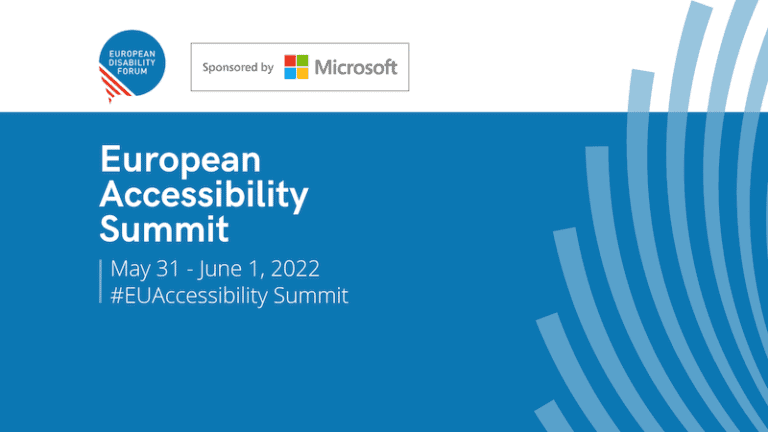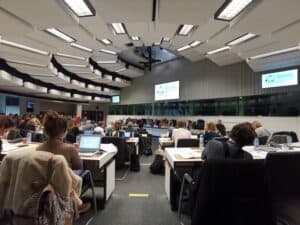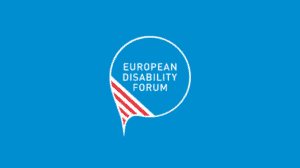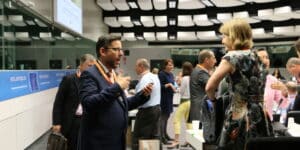On June 8th, the European Union of the Deaf (EUD) followed the European Accessibility Summit 2023 – organised by the European Disability Forum (EDF) and Microsoft. The main topics of the Summit included Artificial Intelligence (AI), designing devices for all (such as payment terminals, ticketing machines, & others), as well as accessible communication and information. The Summit was opened by Ms Catherine Naughton – EDF Executive Director – and Ms Nanna-Louise Linde – Vice-President European Government affairs from Microsoft, highlighting the importance and potential of accessibility as element to ensure the full participation of people with disabilities within several aspects of society. This message was also echoed by EU Commissioner for Jobs and Social Rights, Mr Nicolas Smith, who recalled accessibility as fundamental element of the European Pillar of Social Rights (EPSR) as well as in the AccessibleEU Centre – a flagship initiative of the EU Disability Rights Strategy.
During the session on “Designing devices for all”, several speakers underlined examples of accessible tools implemented by service providers. Mr Tommy Zonnekein, Accessibility Programme Manager, SNCB, highlighted their application SNCB Assist with the ambition to provide National Sing Language interpretation in the future. It was stressed that, if accessibility is not considered in the designing process, then this can create several problems.
Ms Anna Drabarz, Board member, European Disability Forum (EDF), mentioned that there is a vast range of applications and platforms that facilitate accessibility, but it is also important to consider the wide range of disabilities; accessibility must be approached on a case-by-case basis. Ms Drabarz also outlined that it is important when establishing accessibility policies, that these include complaint mechanisms in order to gain end-user feedback.
The next session focused on the uptake of accessibility in Europe with perspectives from Ms Jenny Lay-Flurrie, Chief Accessibility Officer, Microsoft and Alejandro Moledo, Deputy Director, European Disability Forum (EDF).
The European Accessibility Act (EAA) was highlighted by Ms Lay-Flurrie, saying that it is going to provide more consistency with accessibility across the EU. Further, it should also drive innovation, as these higher standards for accessibility create a platform for innovation e.g. captioning in Microsoft Teams. However, Mr Moledo mentioned that the EAA falls short in some ways, but the disability movement is doing its best to ensure that Member States can take advantage of the legislation.
Ms Lay-Flurrie stressed that we must create a culture of accessibility, and that it must not be viewed as an option as it keeps being de-prioritised. For instance, accessibility training is mandatory for all our employees in Microsoft – training is a crucial part of this process. Finally, Mr Moledo highlighted that accessibility can be a way to bridge the employment gap for people with disabilities, as one part of the process is to make workplaces more aware of accessibility.
The next session was on “Seamless and accessible communication and information” where barriers to and solutions around accessible communication and information was discussed. For example, Ms Lidia Best, President, European Federation of Hard of Hearing, mentioned the barrier for deaf people of making phone calls. Further, Ms Best advised that accessibility features must be user-friendly and easy to navigate/find e.g. the captioning option.
Finally, EUD followed the session on “Conversation on Standards and the AccessibleEU Centre” in which Ms Inmaculada Placencia Porrero, Senior Expert in Disability and Inclusion, European Commission, outlined the updates on the AccessibleEU Centre which will be launched on 4th July 2023. The panellists discussed the importance of standardisation for accessibility as standards establish a baseline for users and industry etc. to ensure products and services are more accessible and inclusive. This benchmark is in the EAA and the standards must also reflect the Web Accessibility Directive (WAD). However, standards are voluntary, but they constitute a means to comply with policy on accessibility.













